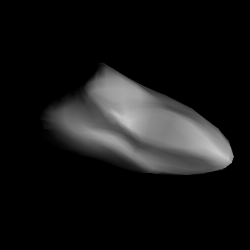Top Qs
Timeline
Chat
Perspective
3103 Eger
Apollo asteroid From Wikipedia, the free encyclopedia
Remove ads
3103 Eger is an Apollo and Mars-crosser asteroid that was discovered in 1982, by Miklós Lovas. It was named after the city of Eger, Hungary. It has an albedo of 0.64,[1] making it a highly reflective asteroid.
Remove ads
Description

It has made and will continue to make many close approaches to Earth. Its closest approach occurred on 6 August 1996, when the asteroid passed 0.11509 AU (17.217 Gm) from Earth.[1] The observed YORP value is (1.4±0.6)×10−8 rad d−2.[3]
3103 Eger is the only asteroid besides 4 Vesta identified as the parent body for specific meteorites. 4 Vesta is the parent body for Howardite, Eucrite, and Diogenite meteorites, while 3103 Eger is the parent body for Aubrite meteorites. In this characteristic 3103 Eger is related spectroscopically to the 434 Hungaria type asteroids, which are a Hirayama-family of orbital types, and E-type asteroids which form a spectroscopical type.
Remove ads
See also
References
External links
Wikiwand - on
Seamless Wikipedia browsing. On steroids.
Remove ads

